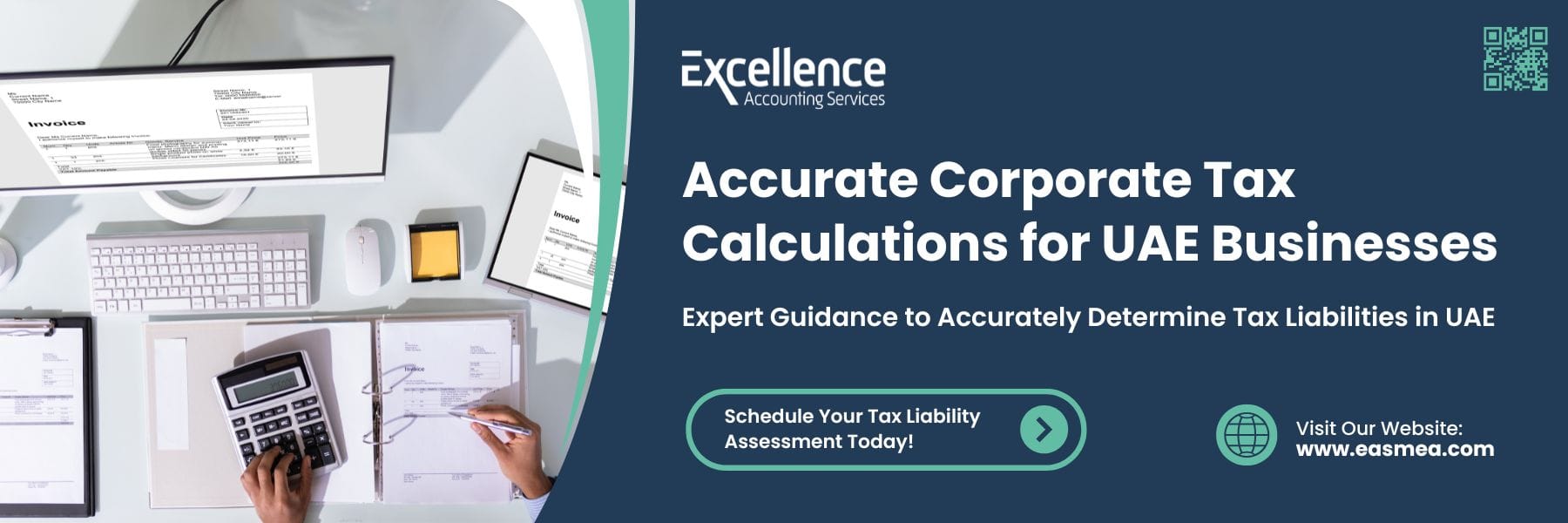Corporate tax liabilities are an integral part of operating a business in the UAE’s dynamic economic landscape. With the recent introduction of corporate taxes, it has become more critical than ever for businesses to fully understand the tax calculation process. This knowledge is not just about compliance—it’s a vital tool for optimizing financial strategies and ensuring sustainable growth.
Proper corporate tax management allows businesses to avoid penalties, improve cash flow, and make data-driven decisions. By mastering the principles of tax liability calculation, companies can maintain a strong reputation with stakeholders and align their operations with legal standards.
In this guide, we’ll break down the steps for accurately calculating corporate tax liabilities in the UAE and provide actionable tips to simplify the process. You’ll also learn how Excellence Accounting Services can support your business in navigating these complexities effectively.

What is Corporate Tax Liability?
Corporate tax liability refers to the amount a business is required to pay to the government based on its taxable income. It acts as a financial obligation that businesses must meet under the law to ensure compliance with the UAE’s corporate tax regulations. Accurately calculating this liability involves deducting allowable expenses from total revenue and applying the appropriate tax rate to the resulting taxable income.
Effective management of corporate tax liability is crucial for several reasons:
- Compliance: Adhering to tax laws helps businesses avoid penalties and legal complications.
- Financial Health: Proper calculation ensures that businesses allocate sufficient funds to meet tax obligations without compromising operational needs.
- Strategic Growth: Understanding and managing tax liabilities enables companies to make informed decisions that align with their financial goals.
Key Components of Corporate Tax Liability
| Component | Description |
|---|---|
| Total Revenue | The sum of all income sources, including sales, investments, and other earnings. |
| Allowable Expenses | Costs that are legally deductible, such as salaries, rent, and asset depreciation. |
| Taxable Income | The net income after allowable expenses have been deducted from total revenue. |
| Tax Rate | The percentage applied to taxable income to calculate the tax owed (e.g., 9%). |
By breaking down and understanding these components, businesses can better manage their financial obligations and align their operations with UAE’s regulatory requirements.
Steps to Calculate Corporate Tax Liabilities in UAE
Accurate corporate tax calculations are the cornerstone of compliance and effective financial management. By following these comprehensive steps, businesses in the UAE can calculate their corporate tax liabilities with confidence and precision.
1. Determine Total Revenue
Your total revenue encompasses all income streams generated by your business. This includes:
- Sales Revenue: Proceeds from goods and services sold.
- Investment Income: Earnings from dividends, interest, or other investments.
- Miscellaneous Income: Additional sources such as rental income or royalties.
Formula: ∗∗ Total Revenue = Sum of All Income Sources ∗∗
Pro Tip:
Leverage accounting software to consolidate and track all revenue sources, ensuring accuracy and ease of access.
2. Identify Allowable Deductions
Allowable deductions are essential for reducing taxable income. These deductions must align with UAE tax regulations. Common examples include:
- Employee Salaries and Benefits: Payments for staff, including wages, bonuses, and allowances.
- Operational Expenses: Rent, utilities, office supplies, and maintenance costs.
- Depreciation: Gradual deduction for business assets like vehicles, machinery, and equipment.
- Insurance Premiums: Costs of business-related insurance policies.
Pro Tip:
Maintain detailed records, including invoices, receipts, and contracts, to ensure smooth audits and compliance with tax authorities.
3. Calculate Taxable Income
Taxable income is determined by subtracting allowable deductions from total revenue. This figure is crucial for assessing corporate tax liability.
Formula: ∗∗ Taxable Income = Total Revenue − Allowable Deductions ∗∗
| Category | Examples of Deductions |
| Operational Expenses | Salaries, utilities, office rent |
| Depreciation | Machinery, vehicles, and equipment |
| Insurance | Business-related coverage |
Highlight:
Ensure accuracy in calculating taxable income to avoid over payment or penalties for under reporting.
4. Apply the Tax Rate
Once taxable income is determined, apply the UAE’s corporate tax rate of 9% for income exceeding AED 375,000. Income below this threshold is exempt from corporate tax.
Formula: ∗∗ Corporate Tax Liability = Taxable Income × Tax Rate ∗∗
Example:
- Total Revenue: AED 1,200,000
- Allowable Deductions: AED 600,000
- Taxable Income: AED 600,000 (1,200,000 – 600,000)
- Tax Rate: 9%
- Corporate Tax Liability: AED 54,000 (600,000 imes 0.09)
5. Factor in Exemptions and Reliefs
Certain businesses, particularly those in free zones or specific industries like healthcare or renewable energy, may qualify for tax exemptions or reliefs. To benefit:
- Verify Eligibility: Ensure compliance with all regulatory criteria for exemptions.
- Document Compliance: Maintain thorough records to demonstrate adherence to exemption requirements.
Highlight:
Engage a tax consultant to help navigate exemptions and maximize benefits while maintaining full compliance with UAE laws.
Importance of Accurate Tax Calculations
Accurate tax calculations are essential for the financial health and legal compliance of any business. Missteps in calculating corporate tax liabilities can lead to significant repercussions, including fines, audits, and reputational damage. For businesses operating in the UAE, where corporate tax regulations are newly implemented, precision is even more critical. Here’s why:
Why Accurate Tax Calculations Matter:
- Avoid Penalties: The UAE tax authority imposes hefty fines for late or incorrect filings. Accurate calculations ensure timely and error-free submissions.
- Enhance Cash Flow Management: Knowing your exact tax liability allows you to plan finances effectively, avoiding unexpected shortfalls.
- Foster Trust and Credibility: Accurate reporting demonstrates your business’s commitment to compliance and ethical practices, strengthening relationships with stakeholders and regulators.
Key Benefits of Accurate Calculations
| Benefit | Description |
| Legal Compliance | Ensures adherence to UAE tax laws, reducing the risk of audits and penalties. |
| Improved Forecasting | Provides reliable data for financial planning and budgeting. |
| Operational Efficiency | Minimizes errors and time spent correcting discrepancies. |
Practical Steps to Ensure Accuracy:
- Use Technology: Leverage accounting software to automate tax calculations and reduce human error.
- Maintain Detailed Records: Organize and store financial documents like invoices, receipts, and contracts for easy reference during tax filing.
- Engage Professionals: Partner with tax consultants who understand UAE’s specific tax regulations to ensure compliance.
Accurate tax calculations are not just a regulatory requirement—they’re a strategic advantage that positions your business for long-term success.
Excellence Accounting Services: Your Partner in Tax Compliance
At Excellence Accounting Services, we simplify corporate tax compliance for UAE businesses, ensuring you meet all legal requirements while optimizing financial strategies.
Our Services Include:
- Tax Calculations and Filing: Tailored solutions for accurate and timely tax filings.
- Free Zone Expertise: Guidance on leveraging exemptions and incentives in UAE free zones.
- Audit Preparation: Comprehensive support to ensure compliance and readiness for regulatory checks.
- Technology Integration: Use of advanced accounting tools for real-time tracking and reporting.
Why Choose Us?
- Expertise: Our team stays updated with UAE’s ever-evolving tax regulations.
- Customized Strategies: We tailor our services to align with your unique business needs.
- Proactive Support: From filing deadlines to audit preparation, we handle it all.
Let us handle your tax complexities while you focus on growing your business. Partner with Excellence Accounting Services for stress-free compliance and strategic tax planning.
FAQs: Corporate Tax Liabilities in UAE
The UAE corporate tax rate is set at 9% on taxable income exceeding AED 375,000, while income below this threshold is exempt. This rate aligns with the UAE’s goal of fostering a business-friendly environment while adhering to global tax standards.
Rationale Behind the Rate:
The 9% rate was introduced to maintain the UAE’s competitive edge in the global market. Compared to other GCC countries, the UAE’s corporate tax rate is relatively low, designed to attract foreign investments while ensuring fair contributions to the national economy.
Comparison with Other GCC Countries:
- Saudi Arabia: Corporate tax rates can go up to 20% for non-Saudi entities.
- Qatar: A flat rate of 10% applies to most businesses.
- Oman: Corporate tax is set at 15%.
This competitive positioning ensures the UAE remains a hub for multinational corporations and startups, leveraging its attractive tax regime to boost economic activity.
Allowable deductions are a critical component of corporate tax liability calculations, as they directly reduce the amount of taxable income. Businesses in the UAE can deduct a variety of expenses that are necessary and incurred exclusively for their operations. Below is a detailed breakdown:
Key Deductible Expenses:
- Employee Costs: Salaries, wages, bonuses, and other employee benefits are fully deductible, provided they are documented and align with employment contracts.
- Operational Expenses: Expenses related to the day-to-day functioning of the business, such as office rent, utility bills, and maintenance costs.
- Depreciation: Gradual deduction of the cost of business assets like vehicles, machinery, and office equipment over their useful life. Ensure you follow the depreciation schedule allowed by UAE tax regulations.
- Insurance Premiums: Business-related insurance coverage, including property, liability, and employee health insurance.
- Marketing and Advertising: Costs incurred for promoting your business through campaigns, advertisements, and sponsorships.
- Professional Fees: Payments to accountants, legal advisors, consultants, and other professionals for services rendered.
- Travel and Transportation: Business travel expenses, including transportation, lodging, and meals, provided they are necessary and documented.
- Training and Development: Investments in employee training programs or educational courses aimed at enhancing skills directly related to the business.
Eligibility Requirements for Deductions:
- Expenses must be incurred solely for business purposes and should not include personal or unrelated costs.
- Adequate documentation, such as invoices, contracts, and receipts, must be maintained.
- Deductions must comply with UAE tax laws and regulations, including specific limits or exclusions for certain expense categories.
| Category | Examples of Deductible Expenses |
| Operational Costs | Office rent, utilities, and maintenance |
| Employee Costs | Salaries, bonuses, and benefits |
| Depreciation | Vehicles, machinery, office equipment |
| Professional Fees | Accounting, legal, and consulting services |
Pro Tip:
Regularly review your expenses to ensure you are leveraging all allowable deductions. Implement accounting software to track expenses systematically and generate detailed reports to support your claims during tax filing.
Free zone businesses in the UAE enjoy significant tax benefits designed to foster investment and economic growth. These exemptions are particularly attractive to companies looking to minimize operational costs and maximize profitability while operating within the UAE.
Key Benefits of Free Zone Exemptions:
- Corporate Tax Relief: Many free zone businesses are exempt from corporate tax for a specified period, often ranging from 15 to 50 years. This exemption allows companies to reinvest profits back into their operations or expansion.
- Full Repatriation of Profits: Free zone companies can repatriate 100% of their profits and capital without incurring additional taxes, providing a significant financial advantage.
- No Customs Duties: Goods imported into free zones are not subject to customs duties, which is especially beneficial for trading companies.
- Simplified Regulations: Free zones often feature streamlined registration processes and reduced bureaucratic requirements, making it easier for businesses to set up and operate.
Eligibility Criteria:
To qualify for these exemptions, free zone businesses must adhere to specific requirements:
- Maintain Operations in the Free Zone: Companies must conduct their primary business activities within the designated free zone area.
- Comply with Free Zone Authority Rules: Each free zone has its own regulatory framework that businesses must follow.
- Meet Annual Filing Obligations: Businesses are required to file accurate financial statements and meet any compliance obligations stipulated by the free zone authority.
| Free Zone | Key Benefits |
| JAFZA | 50-year corporate tax exemption, no customs duties |
| DIFC | Zero corporate tax, 100% foreign ownership allowed |
| RAKEZ | 15-year tax exemption, streamlined setup processes |
Highlight:
By operating in a free zone, businesses can significantly reduce their tax burdens while benefiting from modern infrastructure and strategic locations. For optimal results, consult with a tax advisor to ensure compliance with free zone regulations and to leverage these exemptions effectively.
Miscalculating your tax liability can have serious consequences for your business. The UAE government has implemented strict penalties for non-compliance, which include fines, audits, and potential legal action. These repercussions can disrupt operations, strain finances, and damage your company’s reputation.
Key Risks of Miscalculations:
- Financial Penalties: Businesses may face hefty fines for underreporting taxable income or failing to meet deadlines. These fines can escalate with repeated violations.
- Audit Scrutiny: Errors in tax filings can trigger audits, which are time-consuming and can reveal other compliance gaps.
- Reputational Damage: Persistent inaccuracies can erode trust among stakeholders, including investors, partners, and regulatory authorities.
How to Address Miscalculations:
- Rectify Promptly: If you identify an error, amend your tax filing immediately through the appropriate channels.
- Consult Professionals: Engage tax consultants to review your filings and ensure compliance.
- Implement Checks and Balances: Use accounting software to automate calculations and reduce manual errors. Periodic reviews by financial experts can further safeguard accuracy.
Highlight:
Proactively addressing miscalculations not only mitigates penalties but also demonstrates your commitment to compliance, strengthening your position with regulators and stakeholders.
Absolutely, technology can revolutionize the way businesses manage their corporate tax obligations. By leveraging advanced accounting and tax management software, businesses can streamline processes, reduce manual errors, and ensure timely compliance.
Benefits of Using Technology in Tax Management:
- Automation of Calculations: Tools like QuickBooks, Xero, and Zoho Books automatically calculate tax liabilities based on your financial data, eliminating the risk of human error.
- Real-Time Data Access: Cloud-based platforms allow businesses to access and update financial records in real-time, ensuring accuracy and transparency.
- Compliance Tracking: Many software solutions include features that monitor compliance with UAE tax laws, sending reminders for filing deadlines and generating accurate reports.
- Data Integration: These tools can integrate with other business systems, such as payroll and invoicing, providing a holistic view of financial operations.
- Audit Preparedness: Advanced solutions maintain organized records and generate audit-ready reports, saving time and effort during inspections.
Popular Technology Tools for Tax Management:
| Software | Key Features |
| QuickBooks | Automated tax calculations, real-time reporting, and easy integration with banks |
| Xero | Cloud-based system, multi-currency support, and compliance tracking |
| Zoho Books | Simplified tax filing, expense tracking, and detailed financial analysis |
Pro Tip:
Invest in software that aligns with your business size and complexity. Larger businesses may require advanced ERP solutions like SAP or Oracle for comprehensive tax and financial management.
Highlight:
Incorporating the right technology not only simplifies tax management but also frees up time and resources, allowing businesses to focus on growth and innovation.
Avoiding penalties in corporate tax compliance requires a proactive approach and strict adherence to UAE tax regulations. Penalties can arise from late filings, underreporting taxable income, or providing incorrect information. Here’s how to ensure you stay on the right side of the law:
Steps to Avoid Penalties:
- Maintain Accurate Records:
- Keep detailed and organized records of all income, expenses, and financial transactions.
- Use accounting software to track and consolidate data, ensuring nothing is missed.
- File on Time:
- Mark tax deadlines on your calendar and set reminders to avoid late submissions.
- Submit your corporate tax filings well in advance to accommodate any unforeseen delays.
- Understand Regulations:
- Familiarize yourself with UAE corporate tax laws and ensure compliance with every aspect.
- Stay updated on any changes or new requirements introduced by the tax authority.
- Hire Professionals:
- Engage a tax consultant or accountant to review your calculations and ensure accuracy.
- Professional guidance minimizes the risk of errors and ensures compliance with complex regulations.
Highlight:
Proactively implementing these steps not only helps you avoid fines and audits but also strengthens your financial management practices, ensuring long-term business sustainability.
Yes, VAT (Value Added Tax) and corporate taxes in the UAE are managed as distinct entities, each with its own compliance requirements, processes, and regulatory frameworks. Understanding the separation between these two forms of taxation is essential for businesses to avoid errors and streamline financial management.
Key Differences Between VAT and Corporate Tax:
| Aspect | VAT | Corporate Tax |
| Tax Base | Applies to the value added to goods and services | Based on the net taxable income of businesses |
| Rate | Standard rate of 5% | 9% for taxable income exceeding AED 375,000 |
| Filing Frequency | Filed monthly or quarterly | Filed annually |
| Scope | Affects transactions | Impacts overall business profitability |
Compliance Requirements:
- VAT Compliance:
- Businesses must register for VAT if their annual taxable supplies exceed AED 375,000.
- Regular filing of VAT returns, payment of VAT dues, and maintenance of VAT invoices are required.
- Corporate Tax Compliance:
- Corporate tax filings involve calculating net taxable income, applying deductions, and adhering to annual submission deadlines.
- Businesses must maintain detailed financial records for audits and compliance checks.
Highlight:
While both VAT and corporate taxes require meticulous record-keeping and reporting, their separate compliance processes mean businesses should use tailored strategies or dedicated software for each. Engaging professional accounting services can help ensure both VAT and corporate tax obligations are managed seamlessly.
Tax compliance requires businesses to maintain comprehensive and organized documentation to meet regulatory requirements and facilitate accurate filings. Here is a detailed breakdown of the key documentation required:
Essential Documents for Tax Compliance:
- Income Records:
- Invoices for all sales transactions.
- Records of any additional income sources such as interest, royalties, or rental income.
- Expense Documentation:
- Receipts and bills for all operational expenses, including rent, utilities, and employee costs.
- Proof of deductible expenses such as marketing, training, or asset depreciation.
- Financial Statements:
- Up-to-date balance sheets and profit and loss statements.
- Supporting ledgers for all financial accounts.
- Bank Records:
- Monthly bank statements reflecting all business transactions.
- Copies of canceled checks and deposit slips.
- Tax-Specific Documents:
- VAT returns and invoices for businesses registered under VAT.
- Prior corporate tax filings for reference and continuity.
- Employee-Related Records:
- Payroll reports detailing salaries, bonuses, and allowances.
- Records of benefits provided to employees, such as insurance or training costs.
- Asset Records:
- Documentation of purchases, sales, and depreciation schedules for assets.
- Proof of ownership or lease agreements for property or equipment.
Best Practices for Document Management:
- Digital Storage: Use cloud-based tools to securely store and organize all documents, ensuring easy access and retrieval.
- Automation: Implement accounting software to automate record-keeping and generate compliance-ready reports.
- Periodic Audits: Regularly review your documentation to identify and rectify any gaps.
| Category | Examples of Documents |
| Income | Sales invoices, interest statements |
| Expenses | Receipts for utilities, employee costs |
| Assets | Purchase agreements, depreciation schedules |
| Tax Filings | Previous VAT and corporate tax returns |
Highlight:
Maintaining accurate and complete documentation not only ensures compliance but also simplifies audits and reduces the risk of penalties. Investing in professional services for document management can further streamline your tax processes.
Yes, businesses in the UAE have the opportunity to revise their corporate tax filings under certain conditions. Revisions are permitted when errors, omissions, or inaccuracies are discovered in the original filing. This ensures that businesses maintain compliance and avoid potential penalties for incorrect submissions.
Conditions for Revising Tax Filings:
- Error Identification: The need for revision must stem from genuine errors, such as incorrect calculations or misreported figures.
- Timely Action: Most revisions must be submitted within a specified timeframe, typically outlined by the UAE tax authority.
- Supporting Documentation: Any changes made to the original filing must be backed by proper documentation, such as corrected invoices, updated financial statements, or additional receipts.
Steps to Revise a Tax Filing:
- Identify the Issue: Conduct a thorough review of the original filing to pinpoint inaccuracies.
- Prepare Corrected Documents: Compile all necessary paperwork to support the changes.
- Submit a Revised Filing: Use the Federal Tax Authority’s (FTA) portal to update your submission and explain the corrections made.
- Monitor Approval Status: Follow up with the FTA to ensure the revised filing is accepted and processed.
Highlight:
Revising tax filings not only demonstrates a commitment to compliance but also safeguards your business from penalties and reputational risks. For a seamless revision process, consider consulting with a tax professional to ensure all adjustments meet regulatory standards.
Hiring a tax consultant offers significant advantages for businesses aiming to navigate the complexities of corporate tax compliance in the UAE. With ever-evolving regulations, a professional consultant ensures your business stays updated and compliant, avoiding penalties and audits.
Key Benefits of Hiring a Tax Consultant:
- Expertise and Knowledge: Tax consultants possess in-depth knowledge of UAE tax laws, including corporate tax, VAT, and exemptions. They ensure accurate filings by leveraging their expertise to identify potential savings and exemptions tailored to your business needs.
- Time and Resource Efficiency: Managing tax compliance internally can be time-consuming and error-prone. A tax consultant streamlines the process, allowing you to focus on core business operations while ensuring that all deadlines are met.
- Minimized Risk: Errors in tax calculations or filings can lead to hefty penalties or legal complications. A tax consultant reviews your financial records meticulously, mitigating risks and ensuring compliance with the latest regulations.
- Strategic Planning: Beyond compliance, tax consultants provide strategic advice to optimize tax liabilities. They help businesses structure their operations to benefit from available deductions, exemptions, and incentives, aligning tax strategies with long-term financial goals.
- Audit Preparedness: Should your business face an audit, a tax consultant acts as your representative, managing documentation and interactions with tax authorities to ensure a smooth process.
Highlight:
By hiring a tax consultant, you not only ensure compliance but also gain a trusted partner who supports your business growth through effective tax management and strategic planning.
A tax consultant ensures accurate filings by leveraging in-depth knowledge of UAE tax laws, identifies eligible exemptions tailored to your business model, and provides strategic solutions to optimize liabilities while ensuring full regulatory compliance. By staying updated on the latest amendments and policies, they act as a critical resource in simplifying complex tax processes and safeguarding your business from potential penalties or oversights.
Conclusion: Take Charge of Your Corporate Tax Liabilities
Corporate tax compliance in the UAE is more than just a regulatory obligation—it is a cornerstone for building a resilient and scalable business. By proactively understanding your corporate tax liabilities and adopting a systematic approach to calculations, you safeguard your company from penalties and legal repercussions. Proper financial management, supported by accurate tax reporting, not only enhances your operational efficiency but also strengthens stakeholder trust.
Whether you are navigating the complexities of exemptions or aiming to maximize deductions, the process requires diligence and expertise. This is where professional services can make a significant difference. By leveraging tools, technology, and expert guidance, you can turn corporate tax management into a strategic advantage that fuels growth and sustains long-term success.
Take control of your corporate tax journey today. Equip your business with the tools, knowledge, and partnerships it needs to thrive in the competitive UAE landscape.




